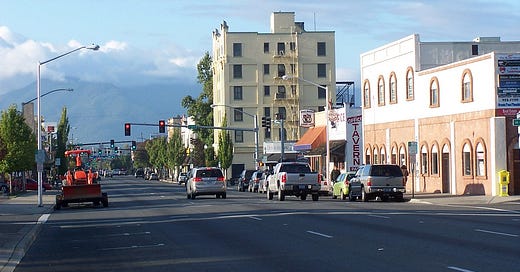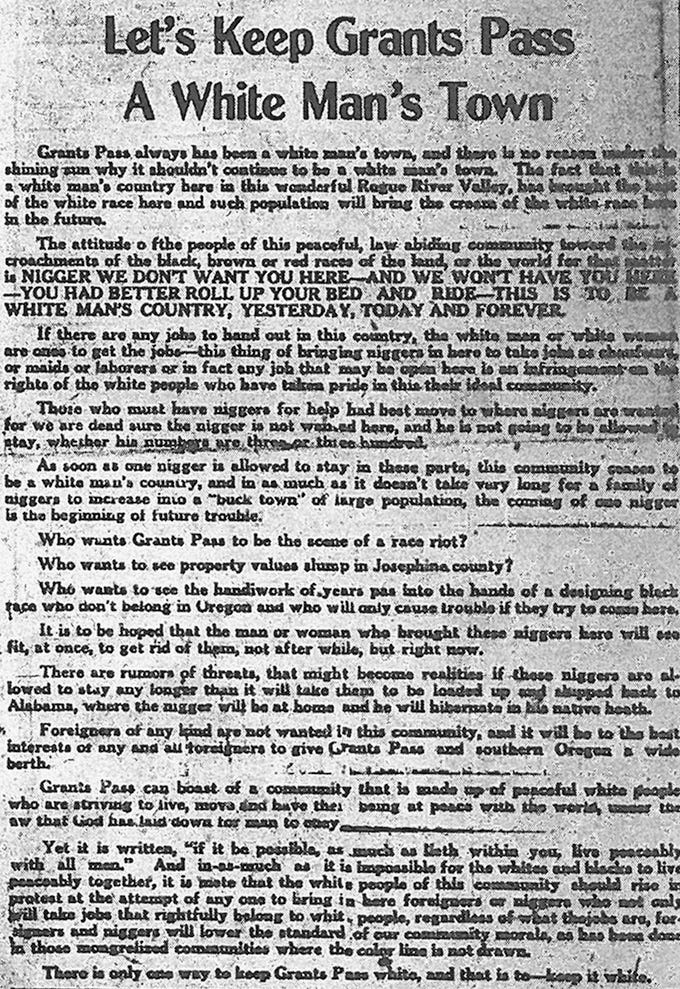Writing a New Ending to the Story of Sundown Towns
A review of Grants Pass's bold effort to confront the past and plan for a more inclusive future.
The racial segregation of the Jim Crow era was not confined to the South. Whites in the North and West often times purposefully excluded African Americans from entire communities, known as “sundown towns.” Sundown towns over the course of American history were a North and West phenomenon. If African Americans were even allowed to come through town during the day, they had better be out by night, or else.
Intimidation, violence, and city ordinances enforced a key desirability of the North and West—the all-white community. Southern signs read “Whites Only” or “Blacks Only.” Signs in the North and West read, “Nigger, don’t let the sun come down on you here.” Some towns would literally ring a bell within the community every single day that indicated that African American had better leave town or face the consequences. It is estimated that over half of Oregon towns were sundown towns. The punitive practice understandably achieved their goal. In 1890, 17 of Oregon’s 36 counties had 0-10 African Americans residing in their community. By 1930, that number would grow to 28 of Oregon’s 36 counties. African Americans were pushed into condensed urban centers as the legacy of Oregon’s Black exclusionary laws evolved into the twentieth century.
Grants Pass was a sundown town. In 1924 there was an editorial in a Southern Oregon newspaper titled “Let’s Keep Grants Pass a White Man’s Town.” In that piece, the author very explicitly said, “Nigger, we don’t want you here.” Forty-six years later, Grants Pass would still be a white man’s town. Oral history posits that Grants Pass had a sign reading “Nigger, don’t let the sun come down on you here” into the late 1960’s/early 1970’s.
In 1970, Grants Pass was 99% white. There were only six Black people in the entire community, or 0.05% of the city’s population and just 0.02% of Oregon’s entire Black population. Today, Grants Pass is 0.8% African American, which amounts to 0.3% of the Oregon Black population. Grants Pass, like many Oregon communities, has been intentionally shaped by decades of exclusion. We are burdened by our history of injustice, but more importantly, we are burdened by our history of silence and inaction.
So, what can Grants Pass do about its history of injustice?
Rewrite the ending to the story of a sundown town.
Create an ending where a formerly exclusionary community can become one of the communities most intentionally committed to inclusivity because of its history.
Use history as a call to action in the present.
Injustice is burdensome, but it can be reconciled. This reconciliation starts with remembrance, then it moves to repair. Sundown laws must become a part of the collective memory and collective consciousness of Grants Pass. We have to know the story of a sundown town in order to understand how to rewrite its ending.
A group in Grants Pass has started a process of truth and reconciliation to use their history as an impetus for becoming a more inclusive community. Education, conversation, and action. They’re looking to culminate this intentional community building with the installation of a historical marker. One side discussing exclusionary laws in Oregon and Grants Pass and the other side functioning as Grants Pass’s stated commitment to inclusivity. The marker would be both past and future oriented and makes this commitment a permanent fixture in the community. This would be the first marker of its kind in the entire United States. Grants Pass will then begin the never-ending journey to live out the ideals written on the marker to validate and affirm the dignity of each of its citizens. Grants Pass will still be predominantly white, but it doesn’t have to a white man’s town. History can be rewritten.
The fundamental belief of the Oregon Remembrance Project is that no matter where you go, you can find enough people who are willing to choose justice if given the opportunity. It’s just a matter of getting them to see where there’s been injustice. We are all more than the worst thing we’ve ever done, and reconciling historical harm requires tapping into all else that we are. Ordinary people have the power to do extraordinary things.
If you would like to follow Grants Pass’s progress toward a more inclusive community, follow the Oregon Remembrance Project on social media.
Founder of the Oregon Remembrance Project. Seeking the truth and repair required to bring us closer to reconciliation.
"Beautiful Downtown Grants Pass, Oregon" by J. Stephen Conn is licensed under CC BY-NC 2.0





I am so grateful for this piece. I am looking for visit Southern Oregon and I keep reading about Medford and Grant’s Pass history.
Grants Pass is a beautiful valley community, nestled amongst beautiful mountains. But, It’s Dark and Gloomy 3 to 4 months out of the year and it rains a lot ( I can’t remember ever seeing the sun 🌞in the wintertime). Summertime is extremely 🥵 hot, high 90s to low 100s. However, if you like low Real Estate prices and Marijuana farms this may be a nice place for you. Everything is really easy to get to and there’s few really nice restaurants right off the famous “Rogue River “. People are somewhat friendly I guess , it definitely has a feel of a small town, it just looks like it’s about 30 years behind. Minorities make up a very very small segment of the population in Grants Pass- I don’t know if it’s ever gonna change. It’s also the birthplace of “Dutch Bros Coffee “